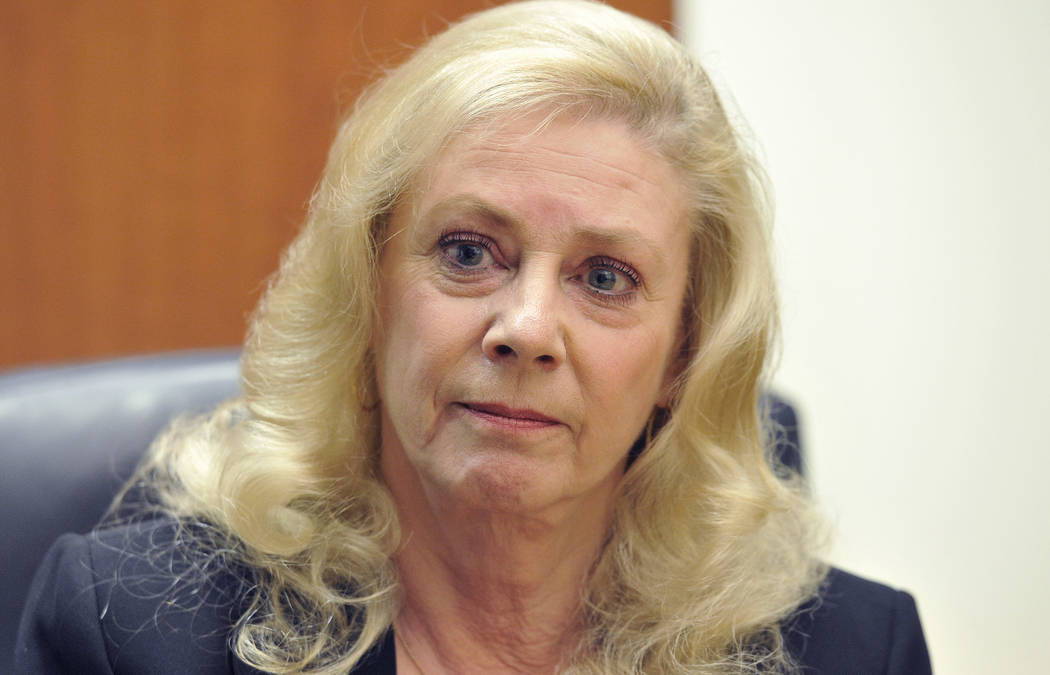Las Vegas woman claims judge used racist term in custody case
Family Court Judge Sandra Pomrenze will not be removed from a custody case for making an “insensitive” comment about a child’s hair, the county’s chief district judge has ruled.
The comment appeared to violate judicial rules against harassment on the basis of race, Chief District Judge Elizabeth Gonzalez wrote, but “it is not, without more, a basis for disqualification.”
Las Vegas resident Mandah Mitchell filed a motion to disqualify Pomrenze after the judge twice referred to her daughter’s hair as “nappy” during a court hearing. Mitchell called the term racist and insulting.
Gonzalez denied the request to remove Pomrenze in an order filed May 14.
“While Judge Pomrenze’s comments about the texture of the child’s hair are certainly insensitive, no showing has been made of any lack of impartiality or improper conduct,” the judge concluded.
Pomrenze used the word “nappy” while speaking to Mitchell about caring for her multiracial daughter’s hair during a Jan. 23 custody hearing. The language formed the basis of Mitchell’s May 7 request for Pomrenze’s removal.
“Your honor could have simply asked the Defendant if her daughter’s hair was of a different texture, what the issues were, and how she had tried to resolve them with the Plaintiff. Instead, your honor displayed outrageous impropriety with her pejorative language and racial epithet,” Mitchell wrote in the motion.
Judge considered term ‘neutral’
Through a courts spokeswoman, Pomrenze provided the following statement to the Las Vegas Review-Journal in response to a request for comment on the issue:
“As a jurist it is my top priority to be fair and impartial to all those who appear before me. My focus in custody cases is on the best interest of children involved while recognizing the challenges litigants face, so that equitable resolutions can be facilitated. If in the course of one of those discussions, I mistakenly used a term that I thought was neutral but was perceived as offensive, I apologize, and will adjust my language.”
A video of the court proceeding shows Pomrenze first asking Mitchell, “Please don’t take it as anything more than a question: Is it nappy?”
Mitchell’s lawyer at the time, Brian Steinberg, quickly responded, “Yes.” Steinberg did not return a call from a reporter seeking comment.
“I just sort of sat there stunned,” Mitchell later told the Review-Journal. “I didn’t know what to say, what to do.”
Pomrenze again used the word during a suggestion that Mitchell take her daughter to a hairdresser, adding that the 3-year-old girl’s hair required special care and that the multiracial mother should learn to care for her daughter’s “probably beautiful curls.”
“Why don’t y’all make an appointment with a hairdresser that has experience with nappy hair and learn how to do it,” Pomrenze said.
Mitchell said she has not filed a complaint with the Nevada Commission on Judicial Discipline.
Professor voices concerns
Javon Johnson, the director of African-American Studies at UNLV, argued that Pomrenze’s word choice “subtly and not so subtly continues whiteness as the standard to which we ascribe good and bad.”
The typical straightness of natural white hair is assigned values of good or correct, he said, while the curls often associated with natural black hair are considered unkempt.
“The very way that my body wants to grow my hair is not up to standard, which is ridiculously and troublingly problematic,” said Johnson, who is black.
Intent is important in understanding how to approach the response to the word, he said. It’s up to the judge to explain what her intent was, as intent is difficult to know, he said.
“The larger concern here is that someone who judges over people’s lives who seemingly views nappy hair as bad,” Johnson said. “What happens if I come to the court with nappy hair, which is to say my natural hair?”
If she ultimately meant well, Johnson said, Pomrenze’s phrasing of the original question still demonstrates she had a clear understanding that there were cultural and racial implications behind the word’s use.
“There’s no need to brace for a fall unless you think the fall is coming,” he said.
Webster’s New World College Dictionary includes the following definition of the word “nappy:” “kinky; frizzy; said esp. of the hair of blacks and sometimes used derogatorily.”
Pomrenze, who is not seeking re-election once her term ends in January 2021, did not practice family law before she was elected to the Clark County bench in 2004. In the Review-Journal’s 2013 Judicial Performance Evaluation, only 47 percent of the lawyers surveyed said she should be retained.
The survey showed that 71 percent of lawyers considered her “adequate” or “more than adequate” on the survey’s substantive questions.
Pomrenze graduated from John Marshall Law School in Illinois in 1977. She has been licensed to practice law in Nevada since 1986.
Mitchell, who now represents herself, plans to take her case to the Nevada Supreme Court. She and the child’s father, who is white, have joint custody. Both parents want primary custody.
Contact Mike Shoro at mshoro@reviewjournal.com or 702-387-5290. Follow @mike_shoro on Twitter.























